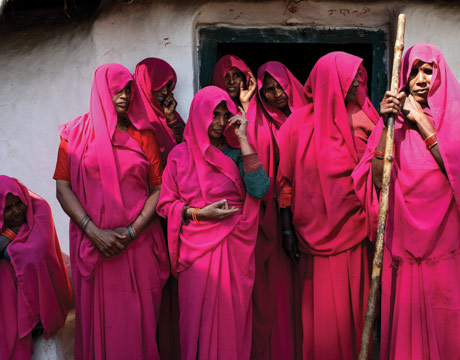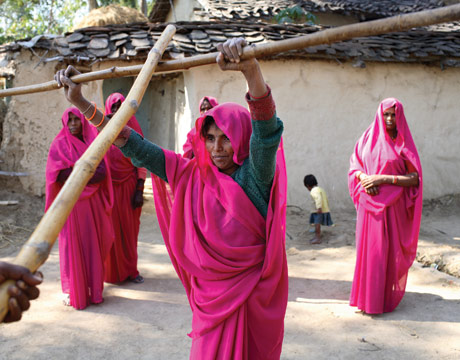
Fighting Back Against Abuse
If Baldev Mutta’s cellphone rings in the middle of a meeting, he picks it up. If it beeps over dinnertime or at midnight, he answers it. And if he has to go out to pick up a woman and find her a spot at a shelter at 3 a.m., he will do it. “It can mean the difference between life and death for a woman,” said Mutta, executive director of Punjabi Community Health Services in Brampton. “They are abused and don’t have anywhere else to go. This agency is their lifeline.” [link]
The Punjabi Community Health Services is an organization based in Brampton, Canada which provides various services to Punjabi women who have been abused. Instead of waiting for women to turn up at their doorstep, this organization takes a proactive approach by sending workers into the community to speak with abused women. They visit Gurdwaras and community centers to find women in distress. At times they must speak with the women secretly at doctor’s appointments, grocery stores, even parking lots, so their families don’t find out.
::
 In related news, I recently read an article about the “Gulabi Gang” in an issue of Marie Claire which appeared on New America Media yesterday aswell. The Gulabi Gang are a group of women in India who have come together to fight against abuse. When local officials refused to take action against an alleged rapist, scores of pink-sari-clad women stormed the police station, demanding action – and thus, became know as the Gulabi Gang. For example, when Sampat Pal Devi learned that a friend had been beaten by her alcoholic husband and that the local police, chronically indifferent to violence against women, had looked the other way, something inside her snapped. In an effort to fight back, she gathered dozens of her female neighbors, armed them with sticks, and taught them how to fight back. Together, the self-declared Gulabi Gang have beaten up accused rapists, profligate officials, and husbands who’ve abandoned their wives.
In related news, I recently read an article about the “Gulabi Gang” in an issue of Marie Claire which appeared on New America Media yesterday aswell. The Gulabi Gang are a group of women in India who have come together to fight against abuse. When local officials refused to take action against an alleged rapist, scores of pink-sari-clad women stormed the police station, demanding action – and thus, became know as the Gulabi Gang. For example, when Sampat Pal Devi learned that a friend had been beaten by her alcoholic husband and that the local police, chronically indifferent to violence against women, had looked the other way, something inside her snapped. In an effort to fight back, she gathered dozens of her female neighbors, armed them with sticks, and taught them how to fight back. Together, the self-declared Gulabi Gang have beaten up accused rapists, profligate officials, and husbands who’ve abandoned their wives.
::
Historically, in our community and other communities around the world, women haven’t been empowered enough to fight back against injustice. Whether we are discussing domestic abuse, sex-selected abortion, or the use of rape as a policy of war – women’s rights have often been violated. Government-funded programs such as the Punjabi Community Health Services and village-based groups such as the Gulabi Gang are essential in empowering women and providing them basic human rights.
For example, the Punjabi Community Health Services has fielded more calls in recent months. Mutta attributes the rise in domestic abuse cases in part to the recession. “When men lose their jobs, they get frustrated, drink more and then abuse women.” Another reason might be the agency’s success in gaining women’s trust, he says, so more women are willing to report abuse.
“Many (women) also don’t know about the resources available; others are terrified to tell anyone because they think it can boomerang on them,” said Amandeep Kaur, who works for the agency. Kaur fled her own abusive marriage after coming to Canada in 1988. She remembers when a client called around midnight, saying her husband was drinking heavily and verbally abusing her. Fearing for the woman’s life, Kaur asked if she could leave the home. The woman couldn’t get a cab, so Kaur picked her up and brought her to her own house.
 Similarly, the Gulabi Gang goes beyond simply fighting back and are working to establish a livelihood for women who have been abused by establishing businesses for them. This group of women clearly understand that with economic stability, women are empowered. They are fighting against injustice by fighting against corruption and poverty. And why the pink saris? For one, it symbolizes feminism – but beyond that, it’s a color that unites women of different religions, societies, and political parties.
Similarly, the Gulabi Gang goes beyond simply fighting back and are working to establish a livelihood for women who have been abused by establishing businesses for them. This group of women clearly understand that with economic stability, women are empowered. They are fighting against injustice by fighting against corruption and poverty. And why the pink saris? For one, it symbolizes feminism – but beyond that, it’s a color that unites women of different religions, societies, and political parties.
More often than not we hear and discuss stories where women’s rights have been violated. However, there is much hopeful news (which often goes unreported) and I think it’s important to celebrate these small victories of women and men who stand up against injustice too.
A movie is currently being made about the Gulabi Gang – you can view photographer, Sanjit Das’ pictures of the pink “vigilantes” here.














How interesting! I wonder if the gulabi gang is inspiring other women in villages to rise up against abuse? I'm not sure we would see this in Punjab.
How interesting! I wonder if the gulabi gang is inspiring other women in villages to rise up against abuse? I’m not sure we would see this in Punjab.
Harpreet, why wouldn't you see this type of mobilization in Punjab?
Harpreet, why wouldn’t you see this type of mobilization in Punjab?
[…] this is what triggers mine: Anger. Tears. Sickness. Disgust. Fear. Hope. Illumination. Happiness. All, […]
I would like to share my book about surviving abuse.
I would like to share my book about surviving abuse.
All the society members need some skills to make their future successful and bright. They need skills to make their name in the society because otherwise they cannot able to make their name in the society.
Likewise I emptied their eye-sockets and made them larger see. http://caessayhelp.com/buy-essay-papers-in-canada… An anecdote can likewise end your essay in a utile way It is constantly hard to prime a i thing from a grouping of standardized ones.